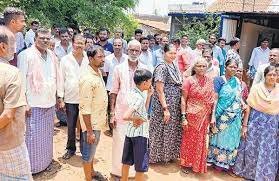Kanasinakatte village, located in Bhadravati taluk, recently made headlines as its residents staged a unique form of protest during the elections. Frustrated with the lack of basic amenities, such as roads and mobile connectivity, the villagers chose to boycott the electoral process altogether. With only three people casting their votes, the situation in Kanasinakatte highlights the urgent need for attention to the concerns and grievances of marginalized communities.
In a display of collective frustration and discontent, the residents of Kanasinakatte village took a bold stand by boycotting the elections. The absence of fundamental necessities had become a constant struggle for the villagers, and they saw this as an opportunity to voice their demands to the concerned authorities.
Plagued by the absence of proper road infrastructure, the villagers faced significant challenges in commuting and accessing essential services. The dilapidated condition of the roads made transportation difficult, especially during monsoon seasons when the area became even more isolated. Consequently, the lack of connectivity impeded economic growth and hindered the villagers’ ability to lead a productive and prosperous life.
Furthermore, the absence of reliable mobile connectivity exacerbated the villagers’ isolation and hampered communication with the outside world. In an era heavily reliant on digital platforms, the lack of connectivity severely disadvantaged the residents, making it difficult for them to access educational resources, employment opportunities, and basic services. The villagers’ boycott was an attempt to shed light on their plight and emphasize the urgent need for improved infrastructure.
In an act of unity, the residents of Kanasinakatte village put up a banner requesting candidates and their supporters to refrain from campaigning within the village. This symbolic gesture aimed to highlight the severity of their grievances and demonstrate the unanimous demand for change. Their intention was clear: they sought action from the authorities to address their basic needs before engaging in the electoral process.
The situation in Kanasinakatte caught the attention of local media, with The Hindu publishing a report that shed light on the residents’ demands. This media coverage helped amplify the villagers’ voice and draw the attention of authorities and public representatives to their struggle.
The boycott of the elections in Kanasinakatte village by its residents serves as a stark reminder of the challenges faced by marginalized communities in accessing basic amenities. The absence of proper roads and mobile connectivity has hindered the villagers’ progress, limiting their opportunities for growth and development. It is imperative that the concerned authorities take immediate action to address these pressing issues and ensure that the grievances of the villagers are heard and addressed. By doing so, they can demonstrate a commitment to inclusivity and work towards creating a more equitable and prosperous society for all.


